Organisational Behaviour Report: Leadership and Management Analysis
VerifiedAdded on 2021/01/01
|10
|2302
|434
Report
AI Summary
This report provides a comprehensive analysis of leadership and management skills within the context of organisational behaviour, using Samsung as a case study. The report begins by comparing the essential skills of leadership and management, highlighting their differences and similarities. It then delves into the qualities that make a good leader and manager, emphasizing ethical considerations and corporate social responsibility. The analysis further includes real-world examples from news reports to illustrate leadership and management practices. Furthermore, the report examines various management and leadership theories, such as scientific management, bureaucratic management, trait theory, and contingency theory, and applies them to the Samsung context. The conclusion summarizes the importance of effective leadership and management in achieving organisational goals, highlighting the practical application of the discussed theories and concepts.
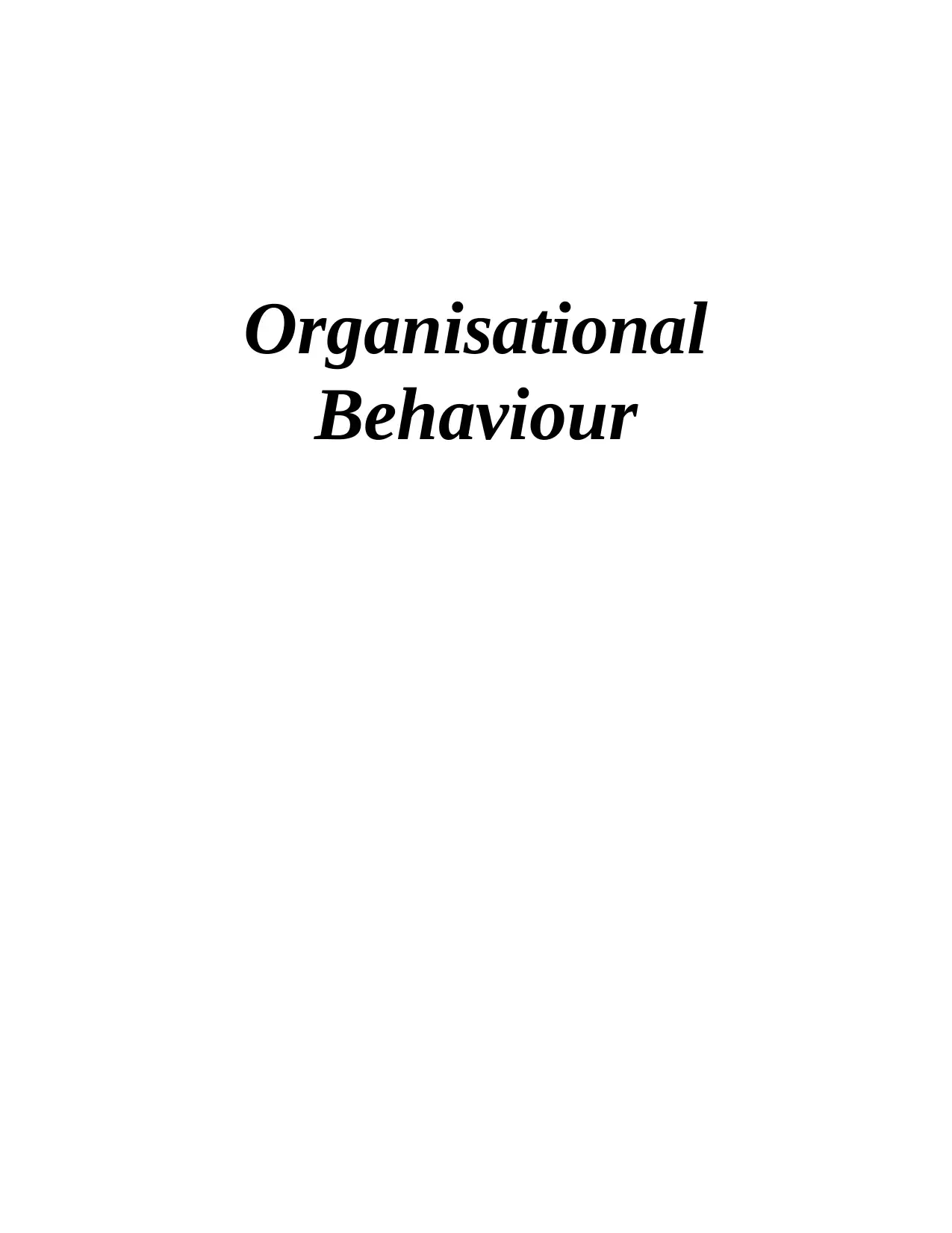
Organisational
Behaviour
Behaviour
Paraphrase This Document
Need a fresh take? Get an instant paraphrase of this document with our AI Paraphraser
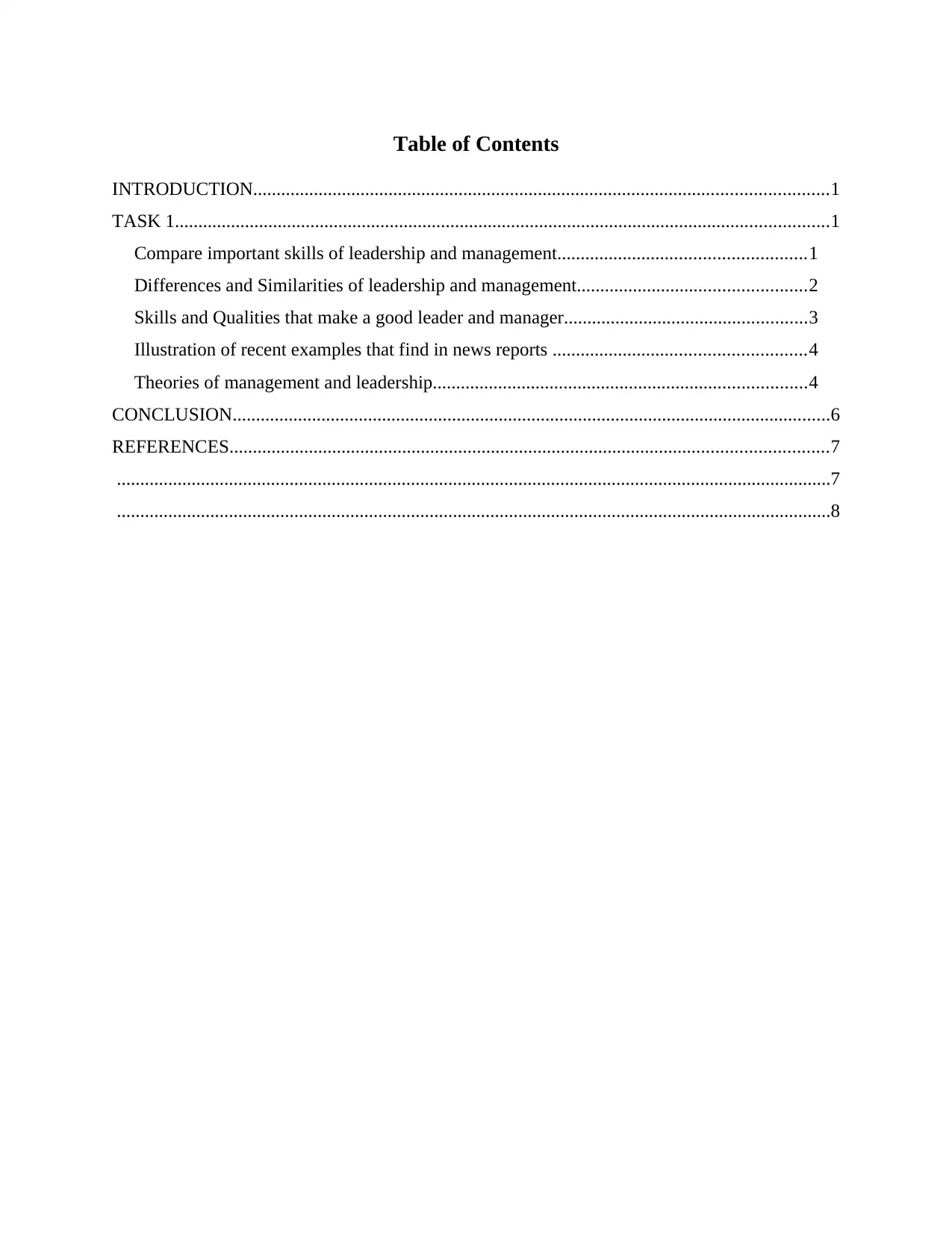
Table of Contents
INTRODUCTION...........................................................................................................................1
TASK 1............................................................................................................................................1
Compare important skills of leadership and management.....................................................1
Differences and Similarities of leadership and management.................................................2
Skills and Qualities that make a good leader and manager....................................................3
Illustration of recent examples that find in news reports ......................................................4
Theories of management and leadership................................................................................4
CONCLUSION................................................................................................................................6
REFERENCES................................................................................................................................7
.........................................................................................................................................................7
.........................................................................................................................................................8
INTRODUCTION...........................................................................................................................1
TASK 1............................................................................................................................................1
Compare important skills of leadership and management.....................................................1
Differences and Similarities of leadership and management.................................................2
Skills and Qualities that make a good leader and manager....................................................3
Illustration of recent examples that find in news reports ......................................................4
Theories of management and leadership................................................................................4
CONCLUSION................................................................................................................................6
REFERENCES................................................................................................................................7
.........................................................................................................................................................7
.........................................................................................................................................................8
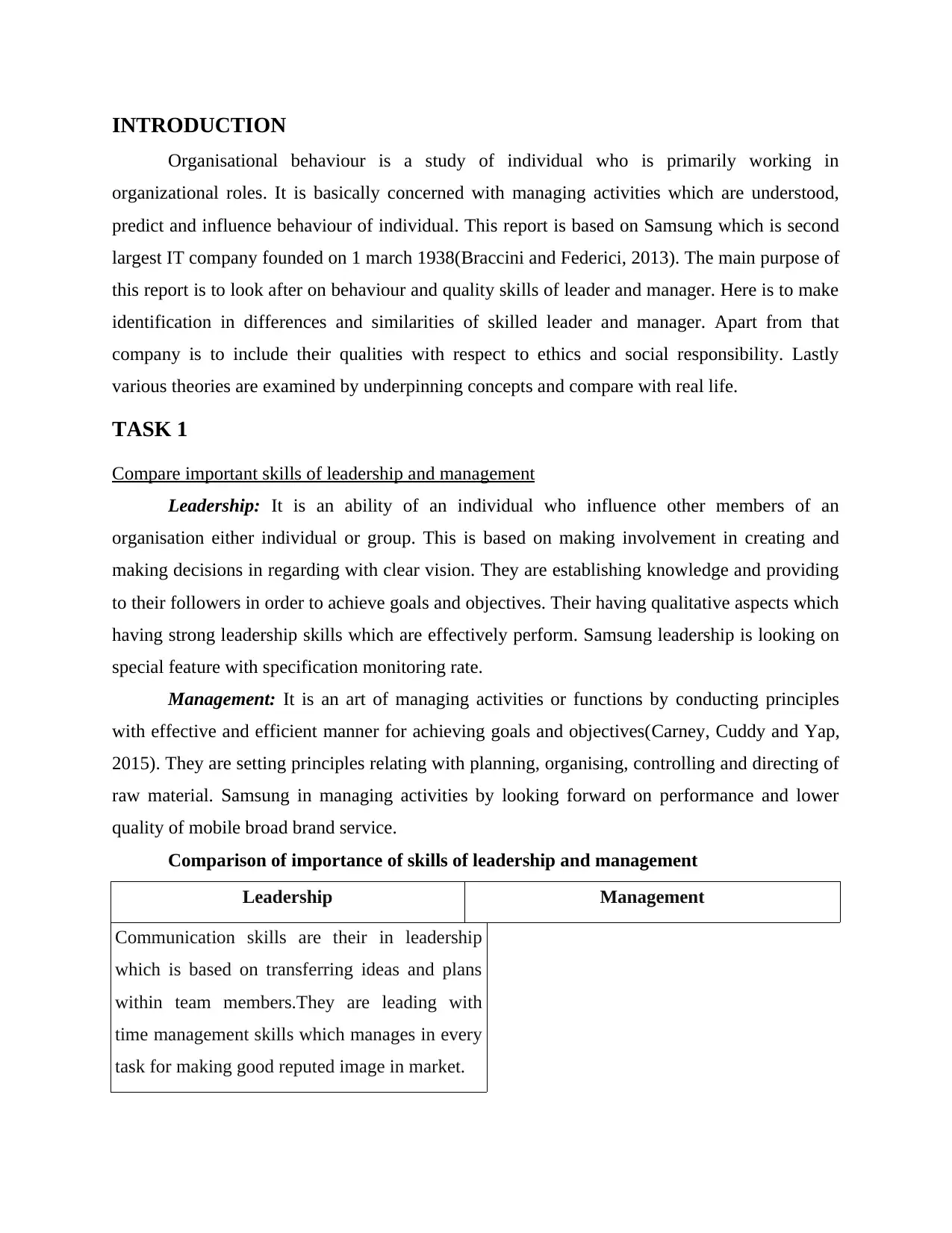
INTRODUCTION
Organisational behaviour is a study of individual who is primarily working in
organizational roles. It is basically concerned with managing activities which are understood,
predict and influence behaviour of individual. This report is based on Samsung which is second
largest IT company founded on 1 march 1938(Braccini and Federici, 2013). The main purpose of
this report is to look after on behaviour and quality skills of leader and manager. Here is to make
identification in differences and similarities of skilled leader and manager. Apart from that
company is to include their qualities with respect to ethics and social responsibility. Lastly
various theories are examined by underpinning concepts and compare with real life.
TASK 1
Compare important skills of leadership and management
Leadership: It is an ability of an individual who influence other members of an
organisation either individual or group. This is based on making involvement in creating and
making decisions in regarding with clear vision. They are establishing knowledge and providing
to their followers in order to achieve goals and objectives. Their having qualitative aspects which
having strong leadership skills which are effectively perform. Samsung leadership is looking on
special feature with specification monitoring rate.
Management: It is an art of managing activities or functions by conducting principles
with effective and efficient manner for achieving goals and objectives(Carney, Cuddy and Yap,
2015). They are setting principles relating with planning, organising, controlling and directing of
raw material. Samsung in managing activities by looking forward on performance and lower
quality of mobile broad brand service.
Comparison of importance of skills of leadership and management
Leadership Management
Communication skills are their in leadership
which is based on transferring ideas and plans
within team members.They are leading with
time management skills which manages in every
task for making good reputed image in market.
Organisational behaviour is a study of individual who is primarily working in
organizational roles. It is basically concerned with managing activities which are understood,
predict and influence behaviour of individual. This report is based on Samsung which is second
largest IT company founded on 1 march 1938(Braccini and Federici, 2013). The main purpose of
this report is to look after on behaviour and quality skills of leader and manager. Here is to make
identification in differences and similarities of skilled leader and manager. Apart from that
company is to include their qualities with respect to ethics and social responsibility. Lastly
various theories are examined by underpinning concepts and compare with real life.
TASK 1
Compare important skills of leadership and management
Leadership: It is an ability of an individual who influence other members of an
organisation either individual or group. This is based on making involvement in creating and
making decisions in regarding with clear vision. They are establishing knowledge and providing
to their followers in order to achieve goals and objectives. Their having qualitative aspects which
having strong leadership skills which are effectively perform. Samsung leadership is looking on
special feature with specification monitoring rate.
Management: It is an art of managing activities or functions by conducting principles
with effective and efficient manner for achieving goals and objectives(Carney, Cuddy and Yap,
2015). They are setting principles relating with planning, organising, controlling and directing of
raw material. Samsung in managing activities by looking forward on performance and lower
quality of mobile broad brand service.
Comparison of importance of skills of leadership and management
Leadership Management
Communication skills are their in leadership
which is based on transferring ideas and plans
within team members.They are leading with
time management skills which manages in every
task for making good reputed image in market.
⊘ This is a preview!⊘
Do you want full access?
Subscribe today to unlock all pages.

Trusted by 1+ million students worldwide
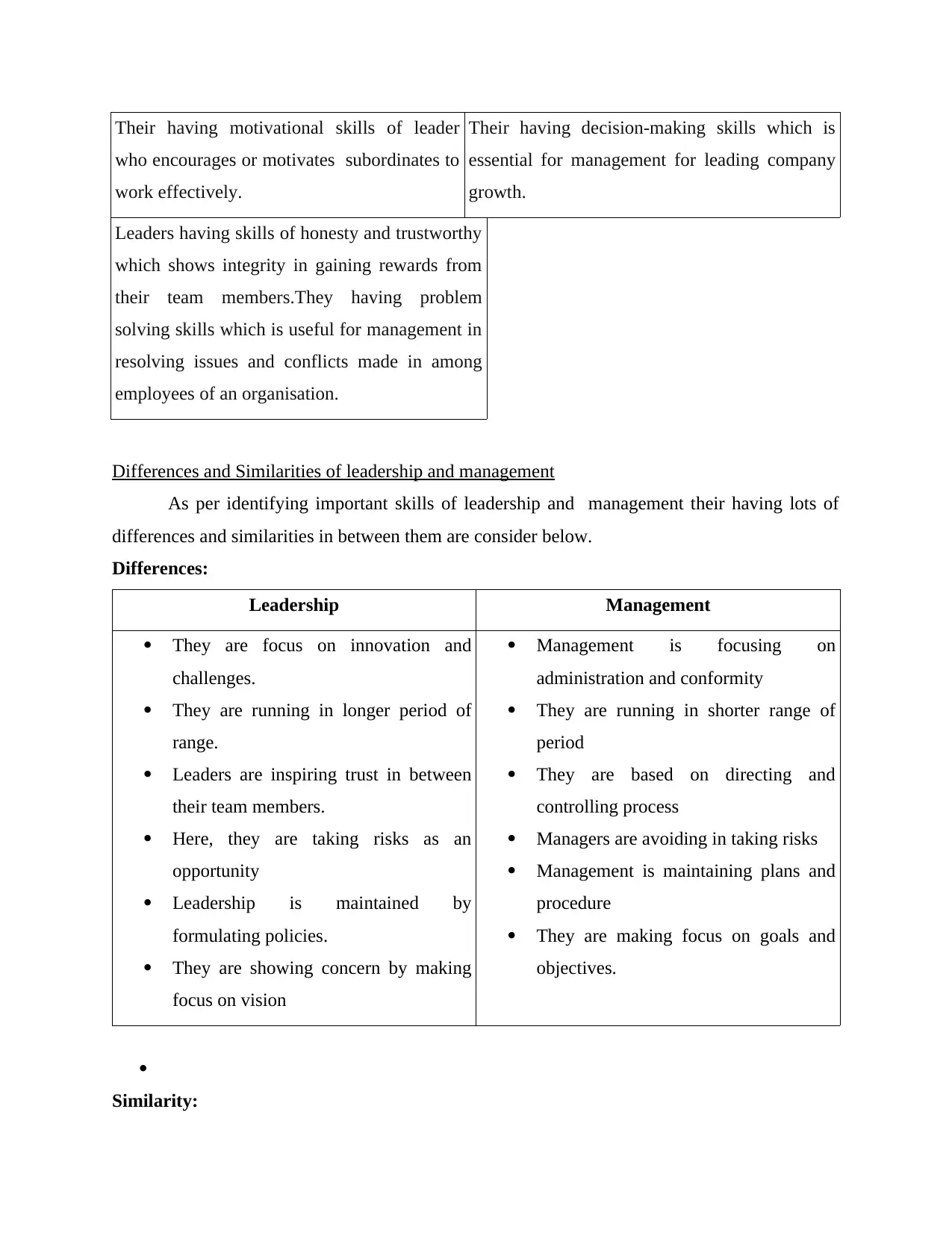
Their having motivational skills of leader
who encourages or motivates subordinates to
work effectively.
Their having decision-making skills which is
essential for management for leading company
growth.
Leaders having skills of honesty and trustworthy
which shows integrity in gaining rewards from
their team members.They having problem
solving skills which is useful for management in
resolving issues and conflicts made in among
employees of an organisation.
Differences and Similarities of leadership and management
As per identifying important skills of leadership and management their having lots of
differences and similarities in between them are consider below.
Differences:
Leadership Management
They are focus on innovation and
challenges.
They are running in longer period of
range.
Leaders are inspiring trust in between
their team members.
Here, they are taking risks as an
opportunity
Leadership is maintained by
formulating policies.
They are showing concern by making
focus on vision
Management is focusing on
administration and conformity
They are running in shorter range of
period
They are based on directing and
controlling process
Managers are avoiding in taking risks
Management is maintaining plans and
procedure
They are making focus on goals and
objectives.
Similarity:
who encourages or motivates subordinates to
work effectively.
Their having decision-making skills which is
essential for management for leading company
growth.
Leaders having skills of honesty and trustworthy
which shows integrity in gaining rewards from
their team members.They having problem
solving skills which is useful for management in
resolving issues and conflicts made in among
employees of an organisation.
Differences and Similarities of leadership and management
As per identifying important skills of leadership and management their having lots of
differences and similarities in between them are consider below.
Differences:
Leadership Management
They are focus on innovation and
challenges.
They are running in longer period of
range.
Leaders are inspiring trust in between
their team members.
Here, they are taking risks as an
opportunity
Leadership is maintained by
formulating policies.
They are showing concern by making
focus on vision
Management is focusing on
administration and conformity
They are running in shorter range of
period
They are based on directing and
controlling process
Managers are avoiding in taking risks
Management is maintaining plans and
procedure
They are making focus on goals and
objectives.
Similarity:
Paraphrase This Document
Need a fresh take? Get an instant paraphrase of this document with our AI Paraphraser
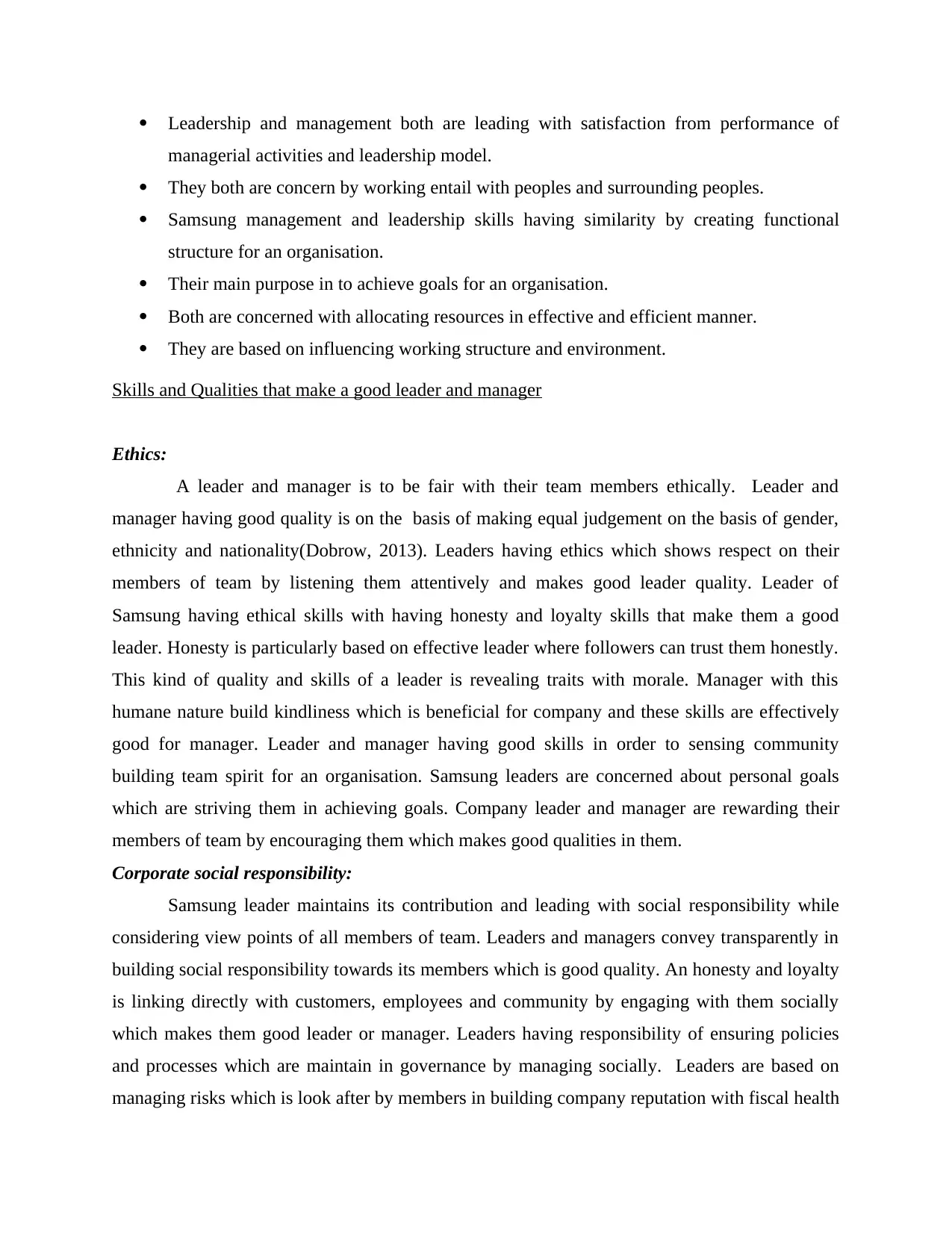
Leadership and management both are leading with satisfaction from performance of
managerial activities and leadership model.
They both are concern by working entail with peoples and surrounding peoples.
Samsung management and leadership skills having similarity by creating functional
structure for an organisation.
Their main purpose in to achieve goals for an organisation.
Both are concerned with allocating resources in effective and efficient manner.
They are based on influencing working structure and environment.
Skills and Qualities that make a good leader and manager
Ethics:
A leader and manager is to be fair with their team members ethically. Leader and
manager having good quality is on the basis of making equal judgement on the basis of gender,
ethnicity and nationality(Dobrow, 2013). Leaders having ethics which shows respect on their
members of team by listening them attentively and makes good leader quality. Leader of
Samsung having ethical skills with having honesty and loyalty skills that make them a good
leader. Honesty is particularly based on effective leader where followers can trust them honestly.
This kind of quality and skills of a leader is revealing traits with morale. Manager with this
humane nature build kindliness which is beneficial for company and these skills are effectively
good for manager. Leader and manager having good skills in order to sensing community
building team spirit for an organisation. Samsung leaders are concerned about personal goals
which are striving them in achieving goals. Company leader and manager are rewarding their
members of team by encouraging them which makes good qualities in them.
Corporate social responsibility:
Samsung leader maintains its contribution and leading with social responsibility while
considering view points of all members of team. Leaders and managers convey transparently in
building social responsibility towards its members which is good quality. An honesty and loyalty
is linking directly with customers, employees and community by engaging with them socially
which makes them good leader or manager. Leaders having responsibility of ensuring policies
and processes which are maintain in governance by managing socially. Leaders are based on
managing risks which is look after by members in building company reputation with fiscal health
managerial activities and leadership model.
They both are concern by working entail with peoples and surrounding peoples.
Samsung management and leadership skills having similarity by creating functional
structure for an organisation.
Their main purpose in to achieve goals for an organisation.
Both are concerned with allocating resources in effective and efficient manner.
They are based on influencing working structure and environment.
Skills and Qualities that make a good leader and manager
Ethics:
A leader and manager is to be fair with their team members ethically. Leader and
manager having good quality is on the basis of making equal judgement on the basis of gender,
ethnicity and nationality(Dobrow, 2013). Leaders having ethics which shows respect on their
members of team by listening them attentively and makes good leader quality. Leader of
Samsung having ethical skills with having honesty and loyalty skills that make them a good
leader. Honesty is particularly based on effective leader where followers can trust them honestly.
This kind of quality and skills of a leader is revealing traits with morale. Manager with this
humane nature build kindliness which is beneficial for company and these skills are effectively
good for manager. Leader and manager having good skills in order to sensing community
building team spirit for an organisation. Samsung leaders are concerned about personal goals
which are striving them in achieving goals. Company leader and manager are rewarding their
members of team by encouraging them which makes good qualities in them.
Corporate social responsibility:
Samsung leader maintains its contribution and leading with social responsibility while
considering view points of all members of team. Leaders and managers convey transparently in
building social responsibility towards its members which is good quality. An honesty and loyalty
is linking directly with customers, employees and community by engaging with them socially
which makes them good leader or manager. Leaders having responsibility of ensuring policies
and processes which are maintain in governance by managing socially. Leaders are based on
managing risks which is look after by members in building company reputation with fiscal health
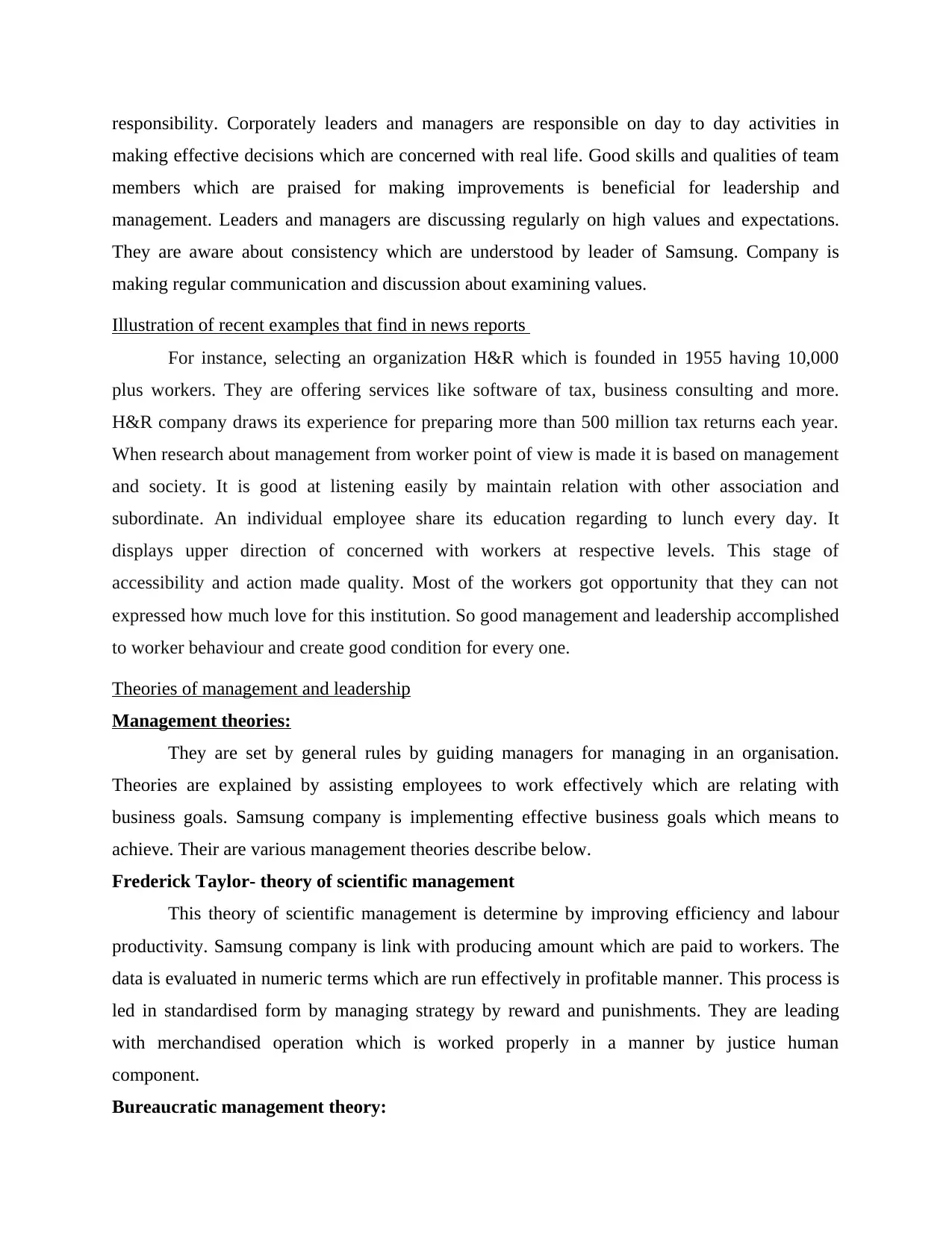
responsibility. Corporately leaders and managers are responsible on day to day activities in
making effective decisions which are concerned with real life. Good skills and qualities of team
members which are praised for making improvements is beneficial for leadership and
management. Leaders and managers are discussing regularly on high values and expectations.
They are aware about consistency which are understood by leader of Samsung. Company is
making regular communication and discussion about examining values.
Illustration of recent examples that find in news reports
For instance, selecting an organization H&R which is founded in 1955 having 10,000
plus workers. They are offering services like software of tax, business consulting and more.
H&R company draws its experience for preparing more than 500 million tax returns each year.
When research about management from worker point of view is made it is based on management
and society. It is good at listening easily by maintain relation with other association and
subordinate. An individual employee share its education regarding to lunch every day. It
displays upper direction of concerned with workers at respective levels. This stage of
accessibility and action made quality. Most of the workers got opportunity that they can not
expressed how much love for this institution. So good management and leadership accomplished
to worker behaviour and create good condition for every one.
Theories of management and leadership
Management theories:
They are set by general rules by guiding managers for managing in an organisation.
Theories are explained by assisting employees to work effectively which are relating with
business goals. Samsung company is implementing effective business goals which means to
achieve. Their are various management theories describe below.
Frederick Taylor- theory of scientific management
This theory of scientific management is determine by improving efficiency and labour
productivity. Samsung company is link with producing amount which are paid to workers. The
data is evaluated in numeric terms which are run effectively in profitable manner. This process is
led in standardised form by managing strategy by reward and punishments. They are leading
with merchandised operation which is worked properly in a manner by justice human
component.
Bureaucratic management theory:
making effective decisions which are concerned with real life. Good skills and qualities of team
members which are praised for making improvements is beneficial for leadership and
management. Leaders and managers are discussing regularly on high values and expectations.
They are aware about consistency which are understood by leader of Samsung. Company is
making regular communication and discussion about examining values.
Illustration of recent examples that find in news reports
For instance, selecting an organization H&R which is founded in 1955 having 10,000
plus workers. They are offering services like software of tax, business consulting and more.
H&R company draws its experience for preparing more than 500 million tax returns each year.
When research about management from worker point of view is made it is based on management
and society. It is good at listening easily by maintain relation with other association and
subordinate. An individual employee share its education regarding to lunch every day. It
displays upper direction of concerned with workers at respective levels. This stage of
accessibility and action made quality. Most of the workers got opportunity that they can not
expressed how much love for this institution. So good management and leadership accomplished
to worker behaviour and create good condition for every one.
Theories of management and leadership
Management theories:
They are set by general rules by guiding managers for managing in an organisation.
Theories are explained by assisting employees to work effectively which are relating with
business goals. Samsung company is implementing effective business goals which means to
achieve. Their are various management theories describe below.
Frederick Taylor- theory of scientific management
This theory of scientific management is determine by improving efficiency and labour
productivity. Samsung company is link with producing amount which are paid to workers. The
data is evaluated in numeric terms which are run effectively in profitable manner. This process is
led in standardised form by managing strategy by reward and punishments. They are leading
with merchandised operation which is worked properly in a manner by justice human
component.
Bureaucratic management theory:
⊘ This is a preview!⊘
Do you want full access?
Subscribe today to unlock all pages.

Trusted by 1+ million students worldwide
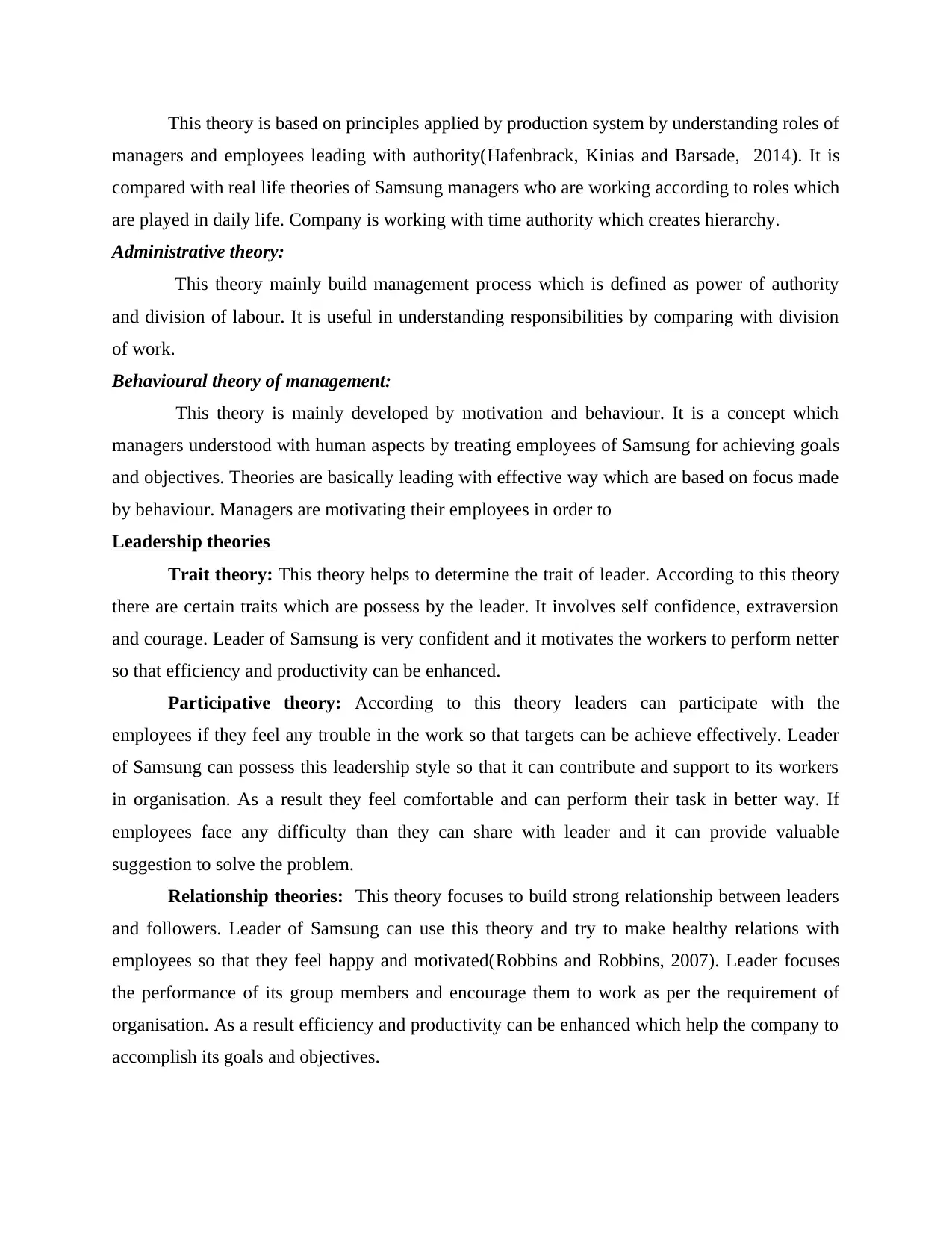
This theory is based on principles applied by production system by understanding roles of
managers and employees leading with authority(Hafenbrack, Kinias and Barsade, 2014). It is
compared with real life theories of Samsung managers who are working according to roles which
are played in daily life. Company is working with time authority which creates hierarchy.
Administrative theory:
This theory mainly build management process which is defined as power of authority
and division of labour. It is useful in understanding responsibilities by comparing with division
of work.
Behavioural theory of management:
This theory is mainly developed by motivation and behaviour. It is a concept which
managers understood with human aspects by treating employees of Samsung for achieving goals
and objectives. Theories are basically leading with effective way which are based on focus made
by behaviour. Managers are motivating their employees in order to
Leadership theories
Trait theory: This theory helps to determine the trait of leader. According to this theory
there are certain traits which are possess by the leader. It involves self confidence, extraversion
and courage. Leader of Samsung is very confident and it motivates the workers to perform netter
so that efficiency and productivity can be enhanced.
Participative theory: According to this theory leaders can participate with the
employees if they feel any trouble in the work so that targets can be achieve effectively. Leader
of Samsung can possess this leadership style so that it can contribute and support to its workers
in organisation. As a result they feel comfortable and can perform their task in better way. If
employees face any difficulty than they can share with leader and it can provide valuable
suggestion to solve the problem.
Relationship theories: This theory focuses to build strong relationship between leaders
and followers. Leader of Samsung can use this theory and try to make healthy relations with
employees so that they feel happy and motivated(Robbins and Robbins, 2007). Leader focuses
the performance of its group members and encourage them to work as per the requirement of
organisation. As a result efficiency and productivity can be enhanced which help the company to
accomplish its goals and objectives.
managers and employees leading with authority(Hafenbrack, Kinias and Barsade, 2014). It is
compared with real life theories of Samsung managers who are working according to roles which
are played in daily life. Company is working with time authority which creates hierarchy.
Administrative theory:
This theory mainly build management process which is defined as power of authority
and division of labour. It is useful in understanding responsibilities by comparing with division
of work.
Behavioural theory of management:
This theory is mainly developed by motivation and behaviour. It is a concept which
managers understood with human aspects by treating employees of Samsung for achieving goals
and objectives. Theories are basically leading with effective way which are based on focus made
by behaviour. Managers are motivating their employees in order to
Leadership theories
Trait theory: This theory helps to determine the trait of leader. According to this theory
there are certain traits which are possess by the leader. It involves self confidence, extraversion
and courage. Leader of Samsung is very confident and it motivates the workers to perform netter
so that efficiency and productivity can be enhanced.
Participative theory: According to this theory leaders can participate with the
employees if they feel any trouble in the work so that targets can be achieve effectively. Leader
of Samsung can possess this leadership style so that it can contribute and support to its workers
in organisation. As a result they feel comfortable and can perform their task in better way. If
employees face any difficulty than they can share with leader and it can provide valuable
suggestion to solve the problem.
Relationship theories: This theory focuses to build strong relationship between leaders
and followers. Leader of Samsung can use this theory and try to make healthy relations with
employees so that they feel happy and motivated(Robbins and Robbins, 2007). Leader focuses
the performance of its group members and encourage them to work as per the requirement of
organisation. As a result efficiency and productivity can be enhanced which help the company to
accomplish its goals and objectives.
Paraphrase This Document
Need a fresh take? Get an instant paraphrase of this document with our AI Paraphraser
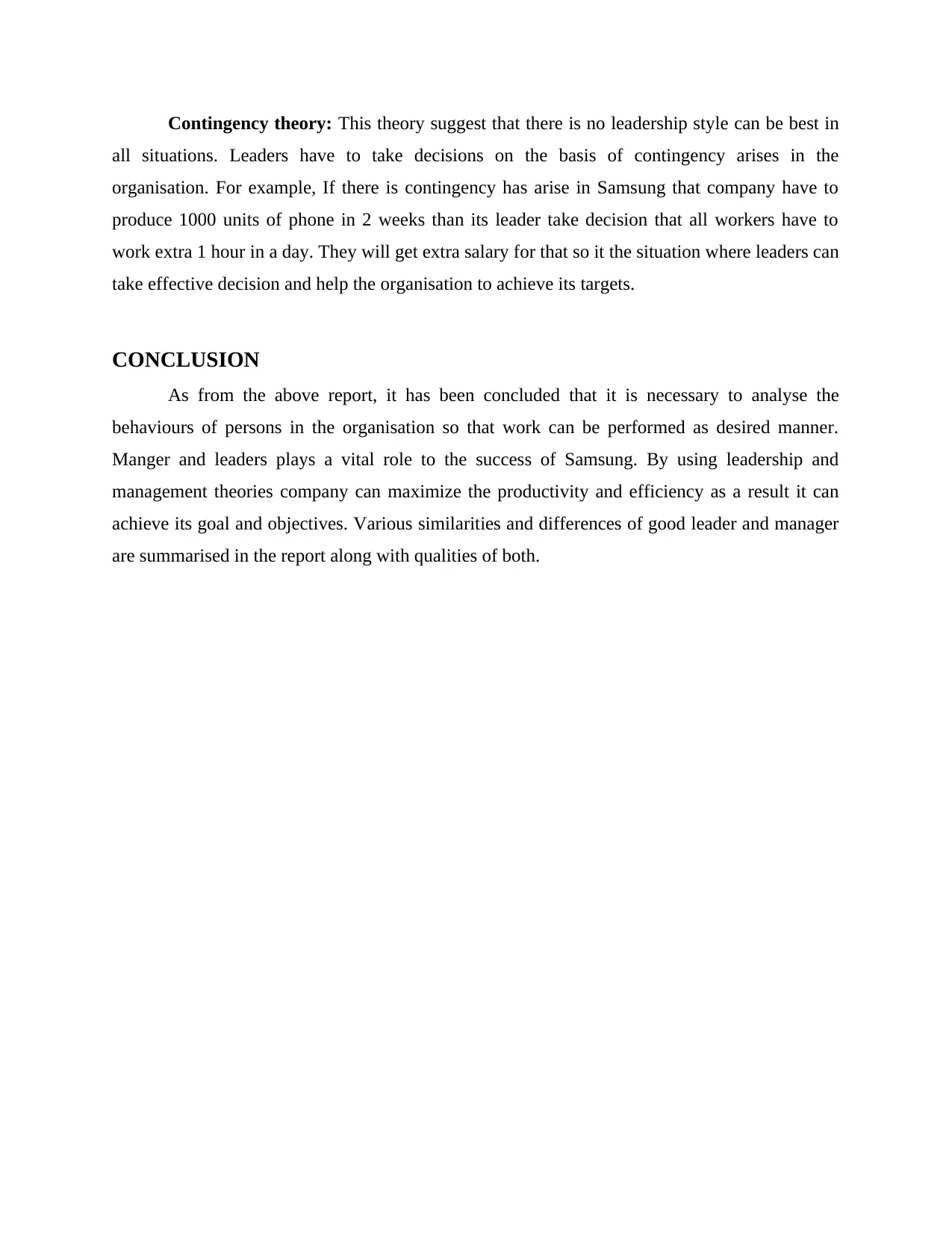
Contingency theory: This theory suggest that there is no leadership style can be best in
all situations. Leaders have to take decisions on the basis of contingency arises in the
organisation. For example, If there is contingency has arise in Samsung that company have to
produce 1000 units of phone in 2 weeks than its leader take decision that all workers have to
work extra 1 hour in a day. They will get extra salary for that so it the situation where leaders can
take effective decision and help the organisation to achieve its targets.
CONCLUSION
As from the above report, it has been concluded that it is necessary to analyse the
behaviours of persons in the organisation so that work can be performed as desired manner.
Manger and leaders plays a vital role to the success of Samsung. By using leadership and
management theories company can maximize the productivity and efficiency as a result it can
achieve its goal and objectives. Various similarities and differences of good leader and manager
are summarised in the report along with qualities of both.
all situations. Leaders have to take decisions on the basis of contingency arises in the
organisation. For example, If there is contingency has arise in Samsung that company have to
produce 1000 units of phone in 2 weeks than its leader take decision that all workers have to
work extra 1 hour in a day. They will get extra salary for that so it the situation where leaders can
take effective decision and help the organisation to achieve its targets.
CONCLUSION
As from the above report, it has been concluded that it is necessary to analyse the
behaviours of persons in the organisation so that work can be performed as desired manner.
Manger and leaders plays a vital role to the success of Samsung. By using leadership and
management theories company can maximize the productivity and efficiency as a result it can
achieve its goal and objectives. Various similarities and differences of good leader and manager
are summarised in the report along with qualities of both.
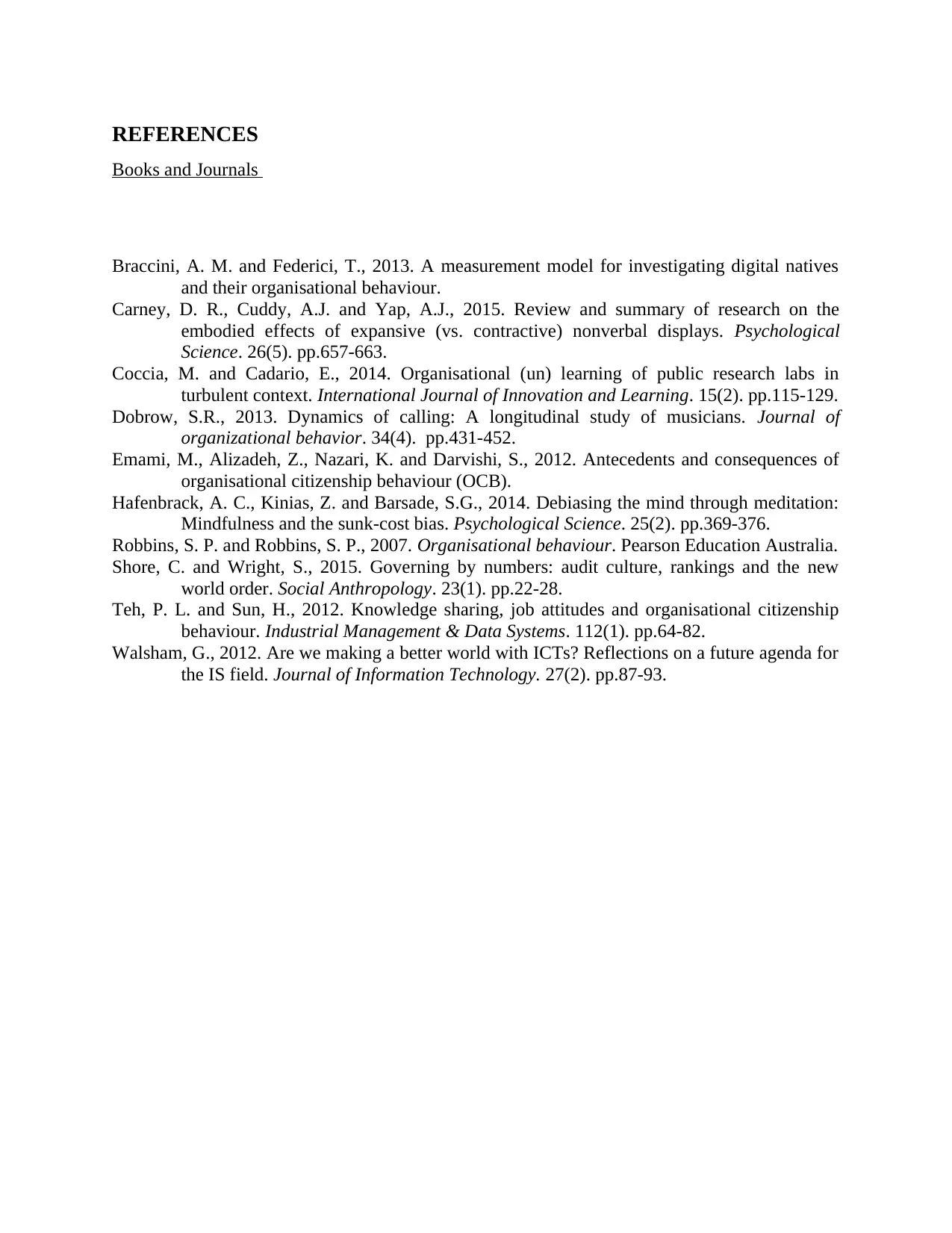
REFERENCES
Books and Journals
Braccini, A. M. and Federici, T., 2013. A measurement model for investigating digital natives
and their organisational behaviour.
Carney, D. R., Cuddy, A.J. and Yap, A.J., 2015. Review and summary of research on the
embodied effects of expansive (vs. contractive) nonverbal displays. Psychological
Science. 26(5). pp.657-663.
Coccia, M. and Cadario, E., 2014. Organisational (un) learning of public research labs in
turbulent context. International Journal of Innovation and Learning. 15(2). pp.115-129.
Dobrow, S.R., 2013. Dynamics of calling: A longitudinal study of musicians. Journal of
organizational behavior. 34(4). pp.431-452.
Emami, M., Alizadeh, Z., Nazari, K. and Darvishi, S., 2012. Antecedents and consequences of
organisational citizenship behaviour (OCB).
Hafenbrack, A. C., Kinias, Z. and Barsade, S.G., 2014. Debiasing the mind through meditation:
Mindfulness and the sunk-cost bias. Psychological Science. 25(2). pp.369-376.
Robbins, S. P. and Robbins, S. P., 2007. Organisational behaviour. Pearson Education Australia.
Shore, C. and Wright, S., 2015. Governing by numbers: audit culture, rankings and the new
world order. Social Anthropology. 23(1). pp.22-28.
Teh, P. L. and Sun, H., 2012. Knowledge sharing, job attitudes and organisational citizenship
behaviour. Industrial Management & Data Systems. 112(1). pp.64-82.
Walsham, G., 2012. Are we making a better world with ICTs? Reflections on a future agenda for
the IS field. Journal of Information Technology. 27(2). pp.87-93.
Books and Journals
Braccini, A. M. and Federici, T., 2013. A measurement model for investigating digital natives
and their organisational behaviour.
Carney, D. R., Cuddy, A.J. and Yap, A.J., 2015. Review and summary of research on the
embodied effects of expansive (vs. contractive) nonverbal displays. Psychological
Science. 26(5). pp.657-663.
Coccia, M. and Cadario, E., 2014. Organisational (un) learning of public research labs in
turbulent context. International Journal of Innovation and Learning. 15(2). pp.115-129.
Dobrow, S.R., 2013. Dynamics of calling: A longitudinal study of musicians. Journal of
organizational behavior. 34(4). pp.431-452.
Emami, M., Alizadeh, Z., Nazari, K. and Darvishi, S., 2012. Antecedents and consequences of
organisational citizenship behaviour (OCB).
Hafenbrack, A. C., Kinias, Z. and Barsade, S.G., 2014. Debiasing the mind through meditation:
Mindfulness and the sunk-cost bias. Psychological Science. 25(2). pp.369-376.
Robbins, S. P. and Robbins, S. P., 2007. Organisational behaviour. Pearson Education Australia.
Shore, C. and Wright, S., 2015. Governing by numbers: audit culture, rankings and the new
world order. Social Anthropology. 23(1). pp.22-28.
Teh, P. L. and Sun, H., 2012. Knowledge sharing, job attitudes and organisational citizenship
behaviour. Industrial Management & Data Systems. 112(1). pp.64-82.
Walsham, G., 2012. Are we making a better world with ICTs? Reflections on a future agenda for
the IS field. Journal of Information Technology. 27(2). pp.87-93.
⊘ This is a preview!⊘
Do you want full access?
Subscribe today to unlock all pages.

Trusted by 1+ million students worldwide

1 out of 10
Related Documents
Your All-in-One AI-Powered Toolkit for Academic Success.
+13062052269
info@desklib.com
Available 24*7 on WhatsApp / Email
![[object Object]](/_next/static/media/star-bottom.7253800d.svg)
Unlock your academic potential
Copyright © 2020–2025 A2Z Services. All Rights Reserved. Developed and managed by ZUCOL.




